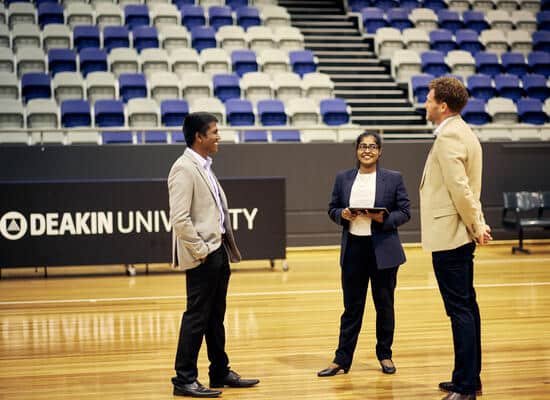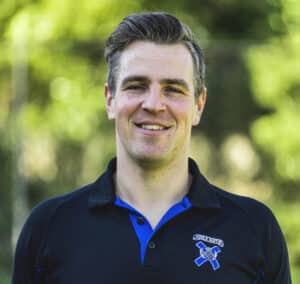
Deakin University is encouraging students to find their way into the Australian sports industry as the largely unknown potential of “The Golden Decade of Sport” picks up momentum.

“The Golden Decade of Sport is a number of major international events that we’re going to be hosting here in Australia,” said Mr Andrew Travis, CEO of Melbourne Olympic Park and Course Advisory Board member for the Deakin Executive Master of Sport Business.
“The eyes of the world will be watching us, and there’s going to be so many opportunities for professionals in the business of sport,” Mr Travis said.
The Queensland Government has projected that in Queensland alone, 130,000 jobs will be created as a direct result of the Brisbane 2032 Olympic and Paralympic Games, but a 2022 national survey by Deakin found that while nearly all Australians (97 per cent) believe that Australia is a sporting nation, there is still low awareness of the projected industry growth and career potential in sport.

In contrast to this general lack of awareness, Professor David Shilbury of Deakin University and Chair of the Sport Management Program said he believes that the number of sports industry jobs currently being advertised has tripled since the sport management programs commenced in 1990.
“The opportunities in the sports business are exponential in this country,” said Professor Shilbury.
The professor also said that the ongoing jobs boom isn’t limited to those directly working in sports but is also relevant to other indirect businesses or professionals in the ecosystem.
This includes marketing agencies, IT companies, law firms, accounting organisations, HR professionals, workforce management experts and event managers, to name a few.
“Either way, what you need is a fundamental understanding of the size, scope and structure of the sports industry,” said Professor Shilbury.
“We find that even people within sport already don’t often understand the totality of the sports industry and its component parts.
“Having that understanding and how each component interacts together gives you the Deakin Executive Masters competitive advantage,” he said.
A Chance To Leave a Lasting Impact On The Sports Industry

Deakin Executive Master of Sports Business student and the Master of Sport at Knox Grammar School, Kieran Donohue, is following his passion and enrolled in the specialised program with a goal to progress his career and leave an impact on the sports industry.
Mr Donohue said he was closer to realising his goal by tapping into the knowledge, experience and networks of lecturers and unit chairs.
“They’re not just academics, but they worked in professional leagues and sporting organisations,” he said.
Understanding That Passion Could Lead To A Dysfunctional Sports Management Career
Whilst passion is the number one reason why people often seek a career in the sports industry, it can also be one the biggest challenges of a sport management career, said Professor Shilbury.
“Sport is something you do in your leisure time, it’s not something that is seen as a serious pursuit by the general population,” he said.
Professor Shilbury’s advice for anyone hoping to transform their passion into a career is to learn how to harness their passion to be functional, not dysfunctional.
“You need to be an objective, rational manager,” he said.
The danger in making the transition is that “people think with their hearts in sport, and everyone in sports think they are an expert,” said Professor Shilbury.
This logic is commonly taken into the boardroom and into sport management rather than being based on evidence-based decisions or market research, he said.
“People that come into the industry from outside the business of sport have a lack of awareness of the failings of passion and the need for rational, objective, independent decision-making”.
A Degree Of Difference Is Required
Sport organisations increasingly must deal with a very complex range of social issues, from who sponsors the team to clashes of player or supporter values. These complex social issues can intersect with the commercialisation of the sports business, as we have witnessed this year within Netball, NRL, The World Cup and Golf, said Professor Shilbury.
According to Professor Shilbury, sport management professionals need to adopt the right managerial style to pre-emptively educate and contain social issues behind closed doors.
That’s because, unlike any other industry, most of these things are in danger of spilling into the media and the public eye and “can be dissected to their death,” he said.
Understanding that you need to adopt a facilitative, consultative managerial style in instances like this is just one of the many benefits of studying the Executive Master of Sport Business, said Professor Shilbury.
The one-of-a-kind qualification is designed as a more advanced version of the Deakin University’s popular Master of Business (Sport Management), which is the number one ranked program of its kind in the country (Sport Business International 2022).
Delivered online via Deakin’s Cloud Campus, the Executive Master of Sport Business provides students with a focus on specific business knowledge, including areas of strategy, sport governance, leadership, and fan and participant engagement.
Ultimately, whether you want to capitalise on the Golden Decade from within a sporting organisation or with employers that are indirectly linked to sports, this degree will give you the skills to confidently undertake a range of sports-related functions such as broadcast rights negotiations, athlete welfare programs and workforce planning.
For more information, visit: https://www.deakin.edu.au/course/executive-master-sport-business









